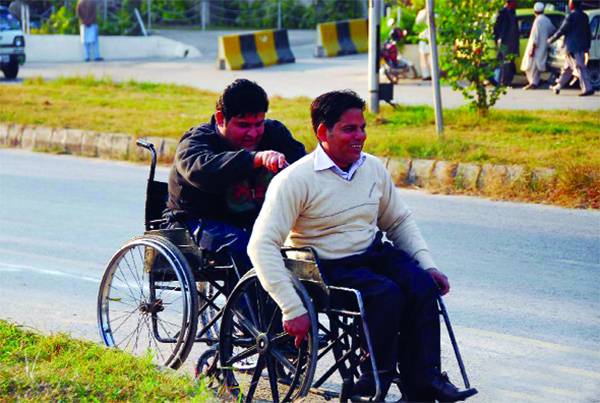
Land grants
Sir,
I am someone who has spent his entire life in Rawalpindi, as part of and amid military families. I have always been in awe of military officers and impressed by the courage of the jawans. However, having seen the military from so close I could not help but feel an uncomfortable surprise at a recent statement given by Lt. General (retd) Shahid Hamid in which he justified the system of land grant to military officers. His claim was that since these men serve the nation for 40 years or more and do not indulge in corruption, they deserve a reward. Moreover, the land grant would help a senior officer retire honourably and not look around for post-retirement jobs.
I fully appreciate the risk that officers and soldiers take in protecting the country but having seen the perks and privileges military officers generally enjoy, I would like to know how has the General calculated reward for public service? How about policemen who are generally underpaid, overworked, poorly trained, and socially berated? Yet they constantly face a threat for which they get nothing as compared to a military officer. I don’t see policemen with batmen who will help iron their uniform, help their wives in the kitchen or perform other chores. And when a policemen dies in the line of duty, he gets a pittance as compared to a military officer. In his 40 years of service, a policeman barely gets enough to marry off a child let alone shoulder other personal responsibilities.
While a good many of us consider military men and women to be the best, have we ever thought of other public servants, who despite their good education and having qualified a tough civil service exam, perform crucial duties of the state with far less pay and remuneration than the military? A retired major in comparison gets two plots and a ten-marla house even if he is considered unfit to serve by his own organization. Compare this with a well-qualified civil servant who will serve the state for sixty years. And yet the General did not speak of his or her honour and dignity.
I hope Lt. General (retd) Shahid Hamid remembers that a four-star general gets so much by the time he retires that he doesn’t need to search for work. Yet many have gone abroad on foreign funding to work in American think tanks or serve foreign governments. You can’t be in the middle of the military and shut your eyes to the array of perks and privileges that uniformed men enjoy. It is in the name of nationalism and love of the country that Shahid Hamid and many like him have to draw a line and think how much is enough.
Sajid Nawaz Malik,
Rawalpindi.
Disabilities and society
Sir,
Pakistan is a country with more than 200 million people. In Pakistan more than 20 million people have different sort of disabilities. There is only one law since 1981, the Disabled Persons Employment and Rehabilitation Ordinance 1981 in existence. There is a vital need to make more laws to protect the rights of people with disabilities.
In Pakistan, the literacy rate is approximately 60 percent and most people with disabilities and their families are uneducated. When a child is born disabled or becomes disabled their families first discourage them from taking part in life and then tell them they are cursed.
Their relatives and society always tell the families to send this child to a special care center and don’t let them lead a mainstream life. Social behavior always forces people with disabilities to live in isolation. Social attitudes are unhealthy towards them.
People with disabilities demand special care and attention from their families. Unfortunately families of people with disabilities mostly consider them a curse or social burden. When they go to school a worse treatment welcomes them. Opportunities are few. Society treats them as objects of pity and fear. They are told the only jobs they can get are in non-profit organisation.
In Pakistan the unemployment rate is very high, thousands of graduates are unable to get a job and in this situation graduates with disabilities have even fewer chances to be considered. In the government sector there is a 2% disability quota, as mandated by the 1981 law. But there is no such quota in the private sector. Because of a lack of technical institutions, technical education and financial help, people with disabilities are unable to start their own businesses as well.
The good news is that the government introduced different social plans for disabled people, which included, special national identity cards, discounts for travel on the railways and airways, and buses. Different public universities offer reduced fees.
The Government of Punjab increased its disability job quota from 2% to 3% and imported special buses for them. But the government is still unable to implement the law when it comes to jobs.
Every year on December 3, the world notes the international day of people with disabilities and it is celebrated in Pakistan as well. Seminars and conventions are arranged to educate and motivate people with disabilities and their families to overcome their challenges. Disabled people should also have access to special housing and transport.
Mian Jamil Ahmad,
All Pakistan Disabled Society.
Turbat hostels
Sir,
Turbat is considered the second largest city of Balochistan and has a well-known college named Atta Shad Degree College, Turbat. Its students number approximately 3,000 and most of them hail from the rural areas and they cannot afford to rent rooms. I request the government to provide hostels for students that they can continue their education.
Irshad Wahid,
Turbat.
Quetta bleeds
Sir,
The year 2016 became the most tragic and devastating year for Quetta, which once again fell victim to terror attacks. Despite being a city on high alert, 62 tragedies unfolded during 2016. Targeted killings claimed the lives of 251 people. Among those casualties were an entire generation of lawyers, young cadets, media persons and citizens. Terrorists have turned it into a graveyard. It is a sign of law and order’s utter failure. The provincial government needs to take immediate measures to prevent such heinous acts from happening.
Mannan Samad,
Turbat.
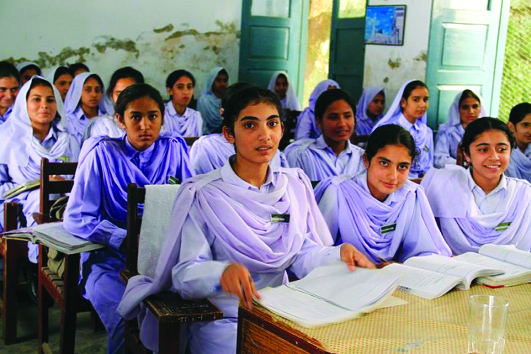
Women’s education
Sir,
Balochistan is one of the largest provinces of Pakistan but unfortunately, its education system is in shambles. We do not see schools, colleges and universities for women in the province. When a girl completes her matriculation, then her parents do not allow her to pursue higher education because there are no places or options for her. I want to draw the attention of the education authority to this.
Mehraj PD,
Turbat.
Police buildings
Sir,
Awaran is one of the neglected districts of Balochistan in terms of its general population. But allow me to highlight that the police are also suffering. They do not have facilities such as electricity, offices and official transport. Balochistan’s government has been attempting to provide for the police in other districts but this area appears to be neglected. Nearly half of the police go to work by foot and live in cottages constructed on their camps. I request the government of Balochistan to construct rooms and provide other essential facilities to the police of Awaraan as soon as possible.
Sanaullah Pendag,
Kech.
Tharparkar suicides
Sir,
Tharparkar in Sindh used to be the largest district in Pakistan, comprising Mirpurkhas and Umer Kot. It was later separated and Mirpurkhas and Umerkot emerged as new districts along political lines. This was a desert with inadequate health facilities, famine and a lack of basic infrastructure. Poverty, hunger, health, nutrition and domestic feuds are some of the challenges people face in this arid zone.
But I would like to highlight that we are experiencing a high suicide rate in this area as well. In one of the recent cases, a pregnant woman committed suicide after killing her children, when she reportedly jumped into a well along with them. They all died. This took place in Islamkot town. This is not a first. Over the past four years when there has been a drought, more than 300 people have reportedly committed suicide.
The people of Tharparkar face drought and water shortages each year. There is a crucial and urgent need to build small dams and associated reservoirs so that water supplies continue in times of drought and famine.
The Pakistan Army had laid a water supply line from the canal system of the tail end of Tehsil Kunri towards Tharparkar. Building canals or redirecting rivers as massive attempts at irrigation in drought-prone areas. At the government level, arrangements can be made for cloud seeding to induce rainfall. The Pakistan People’s Party claims to be the sole representative in the area and comes with its slogan of Marvi Malir, Benazir, Benazir. But little more has been done. The people of Tharparkar have been anxiously waiting for someone to come to their aid.
Mansoor Ahmed,
Faisalabad.
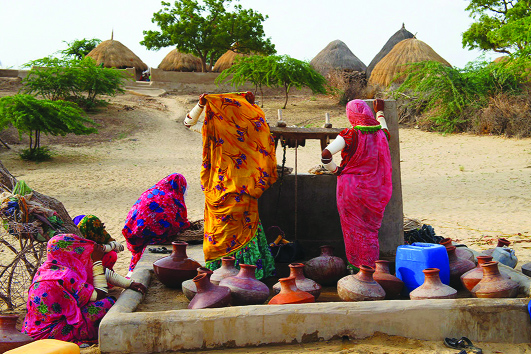
Disadvantages of Whatsapp
Sir,
Whatsapp has become the largest message platform in the world with more than 30 billion messages sent in a day and approximately one billion users. And as with most technology, it comes with good and bad. It has definitely had an impact on the lives of children and young people and some people would argue that it is affecting their studies. They do not give them as much time as a lot is spent on Whatsapp. At work, employees are on their phones instead of working. But more than that, it has become a way for misinformation to spread easily. Research is needed on the overall effect Whatsapp is having on our lives.
Mehraj Altaf,
Turbat.
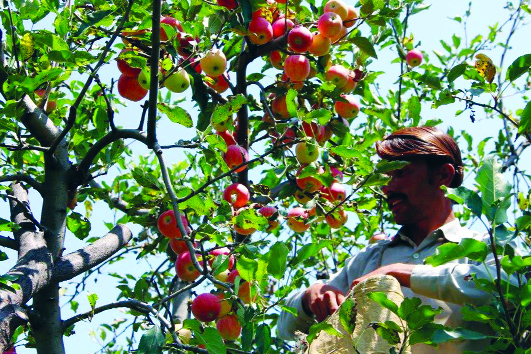
Fruit export
Sir,
Experts have estimated that Balochistan could tap into a tremendous potential if it set up crop-specific zones and fruit processing units. Experts believe that the province should be divided into zones for quality fruit production. In the last few years, Balochistan has developed fruits farms. So research is needed to support this effort. Private farms from other provinces have shown great interest in investing here and setting up businesses in Balochistan, but they are not being encouraged or supported by the provincial government or local communities. I request the government look into this.
Sana Baloch,
Turbat.
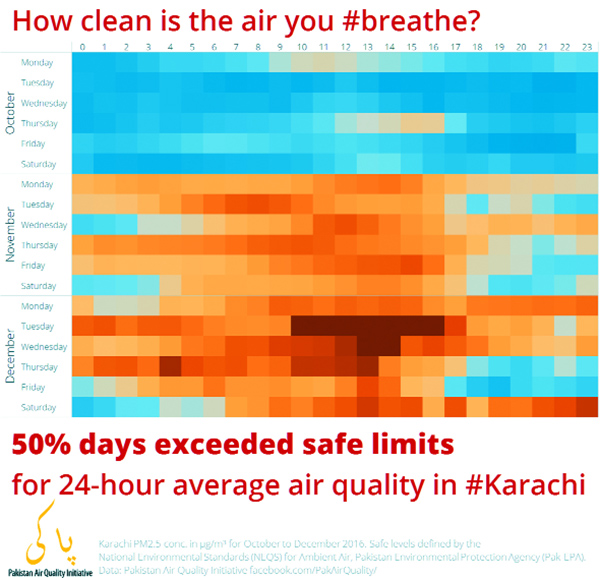
Karachi’s air
Sir,
The PAQI has found that Karachi’s air quality is three to five times above safe levels. The PAQI has been measuring particulate matter (PM2.5) levels in Karachi since October 2016. The measurements show a PM2.5 concentration of 47 micrograms per cubic meter of air (?g/m³) for October to December 2016. The WHO prescribes 10 ?g/m³ as the guideline value for ambient air. Exceeding this value leads to serious public health issues.
Karachi’s air quality is nearly five times above this level, and twice the value for daily exposure. That is also three times the safe levels recommended by the National Environmental Quality Standards for Ambient Air by the Pakistan Environmental Protection Agency (Pak-EPA).
This air quality is better than the previously reported 88 ?g/m³ (intermittent data from 2008-2009), a true picture will emerge after longer-term continuous measurements that can account for seasonal variations. PM2.5 affects more people than any other pollutant.
Karachi’s air pollution is among the most severe in the world. It is a cause for serious health issues. The most health-damaging particles are those with a diameter of 2.5 microns or less, which can penetrate and lodge deep inside the lungs.
High levels of PM2.5 result in reduced visibility or haze. This is commonly mistaken as dust fog, though the reality is that it is smog or air pollution. The major components of particulate matter are sulfate, nitrates, ammonia, sodium chloride, black carbon, mineral dust and water. These present a complex mixture of solid and liquid particles suspended in the air.
Chronic exposure to these breathable particles contributes to the risk of developing cardiovascular and respiratory diseases, as well as of lung cancer. A recent study found that the extremely elevated concentrations of PM2.5 in Karachi are associated with significantly elevated rates of hospital admission. All major cities in Pakistan have air quality problems
Every winter, there is a seasonal smog in Lahore. This winter’s smog is turned into a public health emergency that is exacerbated by seasonal crop burning in the Punjab region. Farmers burn the remaining straw stubble to prepare their fields for the next planting. But this was only the straw the broke the camel’s back. There exist structural problems in Pakistan for controlling polluting emissions. Regulations are required burning of trash, vehicular exhaust, brick kilns, and coal-power plants to make progress for a healthier environment.
Reduce your exposure to harmful air quality by following @KarachiAir on Twitter for hourly updates, or download our partner AirVisual app for air quality alerts. AirVisual provides both real-time and forecast air pollution data together with the knowledge on protecting yourself from air pollution.
Pakistan Air Quality Initiative,
@PakAirQuality.

